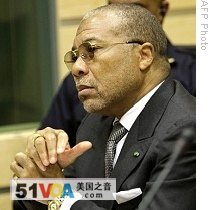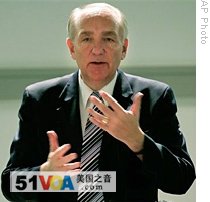Dakar
27 February 2009
 |
| Former Liberian President Charles Taylor sits in courtroom prior to hearing of witnesses in trial in The Hague, 08 Jan 2008 |
The prosecution formally rested its case Friday after hearing from 91 witnesses in just over a year. Mr. Taylor is facing charges of war crimes and crimes against humanity including murder, rape, enslavement, and conscription of child soldiers.
The 11-count indictment alleges that the former Liberian rebel chief led members of Sierra Leone's Revolutionary United Front across the border and he acted as their effective leader for much of Sierra Leone's ten-year civil war.
Mr. Taylor has pled not guilty to the charges which are being heard in a special court jointly established by the United Nations and the government of Sierra Leone. The Freetown session of that court reached its final verdict Wednesday, finding the three most senior surviving members of the rebel RUF guilty of murder, sexual enslavement, and attacks against U.N. troops.
Mr. Taylor's trial had been moved to The Hague because of fears that his supporters might disrupt proceedings held in Sierra Leone.
 |
| Stephen Rapp (file photo) |
"The defense would be in there trying to move to get Taylor freed because it wouldn't be fair to hold him if he couldn't be tried. And that would be a strong argument on their part," he said. "We would, of course, resist it. We would fight to keep him detained. But that is the kind of risk that a court faces. You can't hold somebody in jail indefinitely unless you are able to give him a trial."
Unlike the special courts for Rwanda or the former Yugoslavia which are funded by mandatory dues, Rapp says the special court for Sierra Leone is supported by voluntary contributions.
"It's sometimes a very challenging thing to raise these funds because states don't commit to say we will give you this much this year and this much next and this much the following year," he said. "Each year they have to make a decision."
"And in every country in the world, there are other needs that their government has to respond to. Particularly now with the world economic crisis that has hit some developed countries very hard, and who have very high budget deficits and a lot of needs within their borders, it's difficult to get the pledges that we need," he added.
Rapp expects a verdict by early next year, but only if money is provided to get the court through its funding gap this June, July, and August.
"It's been certainly a well-managed case," he said. "Since Taylor got the attorneys that he wanted, it has moved ahead very, very quickly. And it would be a tragedy if this case were somehow not to be able to be concluded."
The special court has scheduled oral submissions from Mr. Taylor's defense to begin April 6 on a Motion for Judgment of Acquittal. If that is denied, defense lawyers say the former Liberian leader will be their first witness.